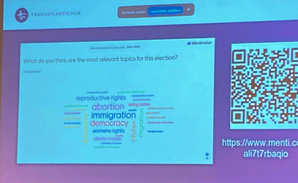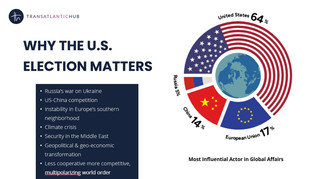The Heart of Democratic Empowerment: Pluralism.
- TRANSATLANTIC HUB

- Jan 6, 2025
- 3 min read
Democracy under Pressure.

As the super election year of 2024 has come to an end, I find myself reflecting: What have I been missing?
What is causing the intense pressure on democracies?
Have we lost faith in the shared values that uphold democratic societies?
In a lecture I delivered at the University of North Carolina - Chapel Hill just before the U.S. elections, I observed that most of the students believed democracy is at risk or, at the very least, were skeptical about the health of U.S. democracy. Many felt that the U.S. election would have a profound impact not only on democracy within the United States but also on democracies around the world.
During the lecture, titled European Perspectives on the U.S. Presidential Election 2024, we explored the question of why Europeans pay close attention to U.S. elections. The United States remains a cornerstone of global stability, with its policies on NATO, trade, and geopolitics having a direct impact on Europe’s future. From the ongoing conflict in Ukraine to the escalating U.S.-China rivalry, the outcome of the presidential election can be expected to significantly impact Europe's security and economic strategies.
The election outcome holds the potential to redefine the transatlantic partnership for years to come, as reduced U.S. military support for Ukraine to concerns over weakened NATO cohesion, the role and actions of U.S. leadership are significant. Moreover, Europe’s reaction to the U.S. election varies: some European countries focus on NATO’s stability and defense commitments, while others emphasize U.S. support for Ukraine or anticipate recognition under President Trump. These diverse perspectives highlight both the interconnectedness yet distinct stakes each country has in the transatlantic relationship.
Under President-elect Donald Trump, the coming years will test whether the U.S. can maintain a strong framework with intact checks and balances, or if democratic institutions will be challenged and thus lose their effectiveness in upholding stability, accountability, and the rule of law.
Following the U.S. election we concluded last year's Transatlantic Hub's Thought Leaders Exchange Series with Ambassador Kurt Volker, former U.S. Special Representative for Ukraine (2017-2019) and U.S. Ambassador to NATO (2008-2009) in an engaging discussion. The roundtable, titled Post-Election Pivot: Shaping the Future of Transatlantic Security, Economy, and Partnership, touched on whether America's system of checks and balances will endure and what to expect from the new administration.
Key takeaways from the discussion included:
Uncertainty about the newly elected U.S. government’s trajectory and the likelihood of challenges to democratic institutions.
The urgent need for Europeans to organize and establish a robust security, economic, and partnership alliance rooted in democratic principles.
A shared responsibility to promote and uphold democracy.
With the polarization we're facing in the U.S. as well as democratic institutions under pressure, we all have to find a way to live alongside individuals and groups who are different from us - promoting the values we stand for and our democracies are built on.
This is why I find it especially meaningful that the 2024 Obama Foundation Democracy Forum in December focused on the concept of pluralism and the idea that in a democracy,
we commit to a system of rules that helps us peacefully resolve our disputes and try to cultivate habits that encourage us to not only tolerate each other but also join in collective action. - President Obama
The Democracy Forum highlighted the importance of people from different backgrounds and experiences coming together in times of challenge and change to build belonging, participation and trust.
In his remarks, President Obama delved into pluralism’s role throughout history, offering a socioeconomic analysis of our current polarization, and affirming key pillars of the centrality of the Constitution and the separation of powers.
His advice was both powerful and simple:
“We don’t have to agree on everything to at least agree on some things.”
Following the U.S. election, the topic of echo chambers was widely discussed, where individuals mainly interact with those who share similar views, which intensifies confirmation bias and political polarization, making them reluctant to consider perspectives that differ from their own. I firmly believe it is important and essential to listen to one another, because, as President Obama noted:
[...] What those leaders are discovering is that, when they listen to people and recognize their multiple identities and seek out common experiences and common values – they’re not just strengthening democratic habits. They’re also building stronger organizations and delivering better results for their members.
So, let's ask ourselves: In a time when much seems to be changing, what can we all do to build connection in disconnecting times, not only through policy and the structure of politics itself but also as individuals?
That's why, in 2025, our Transatlantic Hub events will focus on the Empowerment of Democracy through Leadership. Stay tuned!




























